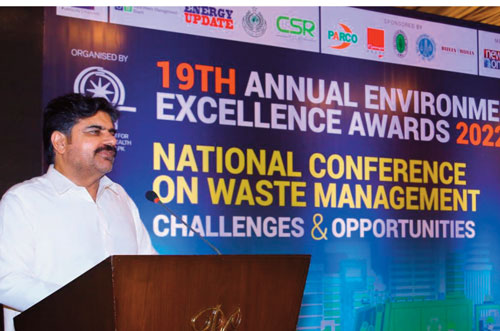Call to develop specialized system to handle 1,100 tonnes of hospital waste generated daily in Karachi to protect public health
There is no separate handling on modern lines of around 1,100 tonnes of garbage generated from hospitals in Karachi daily as haphazard disposal of medical waste creates a serious public health risk.
This was stated by the Dean of Architecture and Management Sciences of the NED University of Engineering & Technology, Prof Dr Noman Ahmed, in his keynote address at the National Waste Management Conference organised by the National Forum for Environment and Health (NFEH) here at a local hotel.
Dr Ahmed said the municipal workers and scavengers in the city were prone to deadly infectious diseases as they handled the hospital waste daily without any safety precautions much like the casual way the municipal garbage is handled in Karachi.He lamented that there was no check at all to stop scavengers from extracting useful and recyclable material from the hospital trash as this practice should come to an end to safeguard public health.He said the hospital waste was quite often mixed with the regular municipal trash generated in the city instead of its disposal in a safe manner.
The senior faculty-member who remained involved in different studies on waste management practices emphasized that hospital waste should be properly segregated before its disposal on a scientific basis.He said the government should provide maximum resources and support for developing an efficient system of hospital waste disposal as unsafe practices in this regard had gravely compromised public health during the coronavirus pandemic.
Dr Ahmed said that barring a few big private hospitals in Karachi, other health care facilities didn’t have any specialized system to handle their waste as their management wanted to perform this essential task with minimal spending.
Zubair Ahmed Channa, Managing-Director of Sindh Solid Waste Management Board (SSWMB), told the audience that a very haphazard system had been present before the SSWMB had come into existence in 2014 for the disposal of 11,000 tonnes of municipal waste generated in Karachi daily.
He said the private contractors and scavengers who had been collecting waste from different neighbourhoods of the city prior to the establishment of the SSWMB hadn’t ensured that the trash collected by them should ultimately reach Karachi’s two proper landfill sites as instead the garbage was thrown at various dumping points nearby residential localities.
He said that before the SSWMB had put in place its proper waste collection system different agencies in Karachi including cantonments didn’t ensure that the waste collected by them should reach the two landfill sites for proper disposal.
He said that SSWMB had ensured that up to 9,000 tonnes of waste generated in Karachi daily reached the landfill sites as just a year ago only 3,000 tonnes of garbage had been reaching these sites for safe disposal.
Channa said that he had been facing immense difficulties to convince the residents of a number of residential localities and office-bearers of various industrial estates in Karachi not to depend any more on irregular private contractors for waste collection as instead, they should fully rely on SSWMB for the same essential service.
He said that owing to improper handling and disposal of trash in Karachi it was utterly difficult to consume municipal waste for useful purposes like waste-to-energy and recycling projects.










